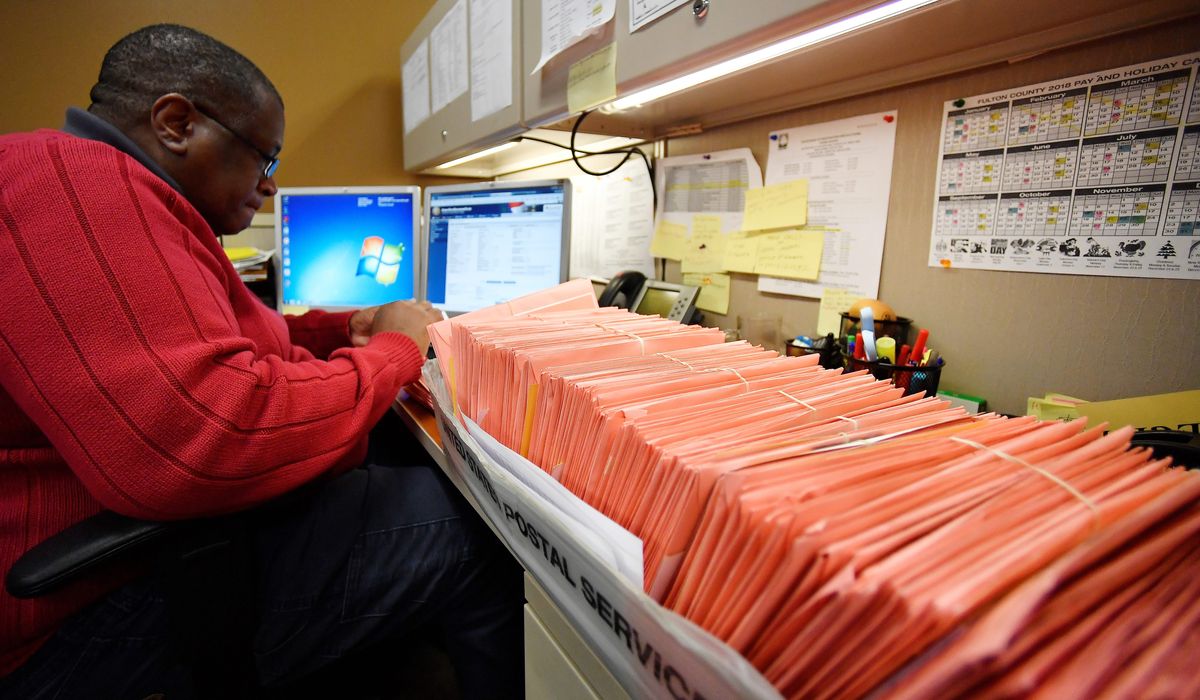Its just starting..
A legal foundation has filed two court briefs that assert that double voting by the thousands happened in 2016-2018 in Georgia and North Carolina, as the nation prepares for its first large-scale, mail-in balloting to elect a president.
Anti-universal mail ballot activists say the two states are a tip-off for what will happen in the Nov. 3 election.
Liberal journalists demand that the Trump administration, which opposes mass-mailed ballots in most states, provide evidence of fraud. The counterargument is that it is difficult to cite such examples when only a handful of states before 2020 adopted remote voting.
A legal foundation has filed two court briefs that assert that double voting by the thousands happened in 2016-2018 in Georgia and North Carolina, as the nation prepares for its first large-scale, mail-in balloting to elect a president.

www.washingtontimes.com
It might have happened in North Carolina. The GOP was already busted for that.
Not Voting twice, duplicate voters on the rolls.
Does it matter why you got caught cheating or the fact that you got caught that matters?
Not at all...I am just clarifying what the lawsuit is about. They want to stop Voting by mail, but it is about getting the cleanest possible rolls before ballots go out.
While cleaning up rolls in itself isn't bad DEPENDING on how it's done, if Trump can vote by mail, everyone can.
And if Trump can be troubled to apply for his absentee ballot, then anybody who needs to vote by mail can be troubled to do the same.
What did I reply to?
They want to stop Voting by mail
Call me crazy, but I assumed that Seawytch was saying that in reference to the specific argument about the universal mail in voting schemes that have been setup last minute, which is specifically what the Trump campaign, most of the Republican party, and most right wing voters are against.
Where is this being done and how would it not work when it works already in a few states?
It seems weird to me to assume that "voting by mail" was meant to be taken at its most literal possible meaning, including absentee voting, considering that I've seen precisely zero right wingers of any note making this argument. In fact, I don't even think I've seen any right wingers on this board saying we need to do away with absentee ballots.
No one is arguing that people need to shut up and go stand in line on voting day?
California, Montana, Nevada, New Jersey, and Vermont have set up schemes to send mail in ballots automatically to all voters while a hand full of states are massively expanding absentee eligibility. The fact that we haven't prosecuted anybody for widespread voter fraud in these systems doesn't make them safe, IMO. We're estimating that 80 million votes (well over half of what was cast in the 2016 general) are going to be going through the mail, which means unsupervised chains of custody. If you leave your front door wide open and go to work, then get home to find that nobody's robbed you, it might just be evidence that you got lucky, and not proof that it's okay to leave your door open every day.
And yeah, I'm sure people have said to shut up and stand in line, I just think, as I said before, that taking such statements as literal and all-encompassing is pretty obviously strawman'ing the point.
Trump's vote is going through that system.
Your point?
It's all good. We should encourage people to vote in the manner that is as easiest for them and makes them the most comfortable.
Why should ease and comfort be the primary concerns when deciding the laws and leadership of our nation?
We shouldn't put restrictions on our Constitutional Rights.
So why not vote by phone or over the internet? That'd be even easier.
That would be great when we get it set up.
Wowzers. At least you're consistent with this goofy line of reasoning.
Out of curiosity, are you also opposed to restrictions on what firearms people are allowed to own, or people with felonies on record being allowed to own them, or a complete elimination of all need for ID or background checks when purchasing a firearm?
I believe if the government can own an arm the people should be allowed to also.......before you go there I understand the logistics with nuclear weapons.
The 2nd was wrote so people could use them against the government if necessary.
We may frequently disagree, but I've gotta admit that you have an interesting spread of opinions.
It's all the same opinion. To not violate people's rights. Our rights are more than the 2nd is it not?
Yeah, no, you definitely appear to be consistent with that principle. Interesting because I didn't take you for a libertarian, but I'm admittedly not the greatest at remembering which viewpoints are associated with which screennames.
It's not even that. I believe in things Libertarians do not BUT I also believe doing nothing is better than doing the wrong thing and often times when left with two candidates that I believe are wrong I will go with the Libertarian candidate. I'm leaning to Jo this time.
Answer me this. People argue all the time that people should just give in when faced with a police officer that is going to violate your civil rights and take it up with the courts. That is of course a lie for many because we see those very people get upset when people win in the courts.......but that aside.
What if the argument was..........just let the government take your guns and fight it out in the court to get them back.
Would that be acceptable?
It's not acceptable in any situation for the police to violate someone's rights, but there's a pretty broad range of particular situations and likely consequences to consider.
If the police showed up to my door right now to confiscate weapons, I would personally allow them to do so and then fight it in court, but only because I don't see it as even remotely likely that they'd be doing so to disarm me as part of a larger plot to use drastic force against me. A legal misunderstanding, even one used to leverage against me a law that I find to be oppressive, is rarely a reason for a fight to the death, which is essentially what any fight against the state is. On the other hand, if I saw them coming down the street knocking on every door for that purpose, I might consider throwing away my scabbard, so to speak, and making them pry my firearm from my cold, dead fingers, but I would do so with the understanding that I'd be forfeiting my life for that principle.
At any rate, in a lot of the high profile police brutality situations of late, the idea that any particular one was initiated by a blatant violation of the victim's rights is debatable to say the least. I would definitely say that, in situations where no such obvious violation occurs, it's reasonable for police officers to violently defend themselves against people who try to fight their way out of getting arrested. From the citizen's perspective, it sucks, but if it seems like the officer is just wrong, but might be acting in good faith with the mistaken belief that you've committed a crime, yeah, I'd generally recommend you suck it up, endure the injustice, and try to redress the situation in court after the fact.
Where voting's concerned, I consider it to be a similarly complex question. I don't like the idea of disenfranchising anyone, but I see that as a justification for an in-person setup with ID required absolutely. Every illegitimate vote cancels out a legitimate opposing vote. The only significant difference between that and actively barring that disenfranchised voter from entering the polling place, is that said legitimate voter would at least be AWARE that he was getting fucked. I also don't see how not expanding voting to allow people to do it from home is tantamount to restricting that right. Nowhere does the constitution directly assert that there's a right to vote that cannot be infringed. We have to infer that right's existence based on the 15th, 19th, 24th, and 26th amendments. Together, these amendments state that the right to vote can't be denied based on race (15th), sex (19th), unpaid taxes (24th), or age for people at least 18 years old (26th). The most recent of these amendments was passed in 1971, a full 27 years before Oregon became the first state to offer universal mail in voting. I see no reason to believe that anyone ever intended for there to be a right to vote that was unduly repressed if people were generally required to show up and exercise this right in person, given that this was already the case when these amendments were passed, and none of them even mention it. Moreover, I find it ludicrous to believe that anybody's right to vote is protected by neglecting the integrity of the process and subjecting it to potential mass fraud.

www.washingtontimes.com
Not Voting twice, duplicate voters on the rolls.It might have happened in North Carolina. The GOP was already busted for that.
www.washingtontimes.com
Not Voting twice, duplicate voters on the rolls.It might have happened in North Carolina. The GOP was already busted for that.

